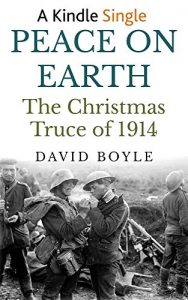Very few events in history were as completely spontaneous, or certainly as unexpected, as the Christmas Truce of 1914.
Warring nations came together to honour tradition and celebrate their shared humanity, proclaiming an unofficial ceasefire as they swapped food, sung carols, and even played football matches against one another.
It is one of those very rare moments during the bloody twentieth century which provide a glimmer of light. It is in some ways the great overlooked moment of the past century – moving, hopeful and filled with possibility.
But how was it viewed at the time? And why did it never successfully happen again? What risks did the men in the trenches run, how did it come about, and did it change their view of the enemy?
The Christmas Truce has become a symbol of hope for human beings working together in desperate situations.
But historians have argued ever since about its significance, ranging from those who believe it was an irrelevance to those for whom it was a moment of enormous significance – and part of that argument is the question of when - and why - the truce officially ended.
This book is designed to tell the story of the truce to a wider audience, as a compelling narrative, stitching together first-hand accounts of the soldiers who lived through it.
A hundred years on, it is still a moment that resonates with audiences around the world.
‘The tone of the book may be gloomy but there is plenty of entertainment value …’ - The Times
‘Exhilarating’ - Daily Mail
‘He tells these stories, on the whole persuasively and with some startling asides.’ - New Statesman
‘A book that is engagingly sensitive to the sentiments of what is sometimes called “middle England”’ - Sunday Times
David Boyle is a British author and journalist who writes mainly about history and new ideas in economics, money, business and culture. He lives in Crystal Palace, London. His books include Alan Turing: Unlocking the Enigma, Unheard Unseen: Warfare in the Dardanelles, Towards the Setting Sun: The Race for America and The Age to Come.
Warring nations came together to honour tradition and celebrate their shared humanity, proclaiming an unofficial ceasefire as they swapped food, sung carols, and even played football matches against one another.
It is one of those very rare moments during the bloody twentieth century which provide a glimmer of light. It is in some ways the great overlooked moment of the past century – moving, hopeful and filled with possibility.
But how was it viewed at the time? And why did it never successfully happen again? What risks did the men in the trenches run, how did it come about, and did it change their view of the enemy?
The Christmas Truce has become a symbol of hope for human beings working together in desperate situations.
But historians have argued ever since about its significance, ranging from those who believe it was an irrelevance to those for whom it was a moment of enormous significance – and part of that argument is the question of when - and why - the truce officially ended.
This book is designed to tell the story of the truce to a wider audience, as a compelling narrative, stitching together first-hand accounts of the soldiers who lived through it.
A hundred years on, it is still a moment that resonates with audiences around the world.
Praise for David Boyle
‘The tone of the book may be gloomy but there is plenty of entertainment value …’ - The Times
‘Exhilarating’ - Daily Mail
‘He tells these stories, on the whole persuasively and with some startling asides.’ - New Statesman
‘A book that is engagingly sensitive to the sentiments of what is sometimes called “middle England”’ - Sunday Times
David Boyle is a British author and journalist who writes mainly about history and new ideas in economics, money, business and culture. He lives in Crystal Palace, London. His books include Alan Turing: Unlocking the Enigma, Unheard Unseen: Warfare in the Dardanelles, Towards the Setting Sun: The Race for America and The Age to Come.






